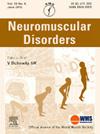03OCognitive development in children with 5q-SMA identified by neonatal screening - 4 years follow-up
IF 2.8
4区 医学
Q2 CLINICAL NEUROLOGY
引用次数: 0
Abstract
The impaired cognitive development of children with 5q-SMA and two SMN2 copies, despite early initiation of therapy, which was detected during neonatal screening, underlines the crucial role of the SMN protein in the early stages of brain development. Long-term data on the cognitive development of these children are lacking to further elucidate the situation. A total of 46 families with 47 children identified in newborn screening were invited to have their children tested with the WISC-IV and the CBCL after the age of four. Twenty-two children with a mean age of 59.09 months (SD = 8.85) were included, 13 girls and 9 boys, 12 patients with two, 5 patients with three, and 5 patients with 4 SMN2 copies. The total IQ score on the WPPSI-IV was in the normal range (M = 87.53; SD = 15.96). The non-verbal index (M = 80.42; SD = 20.51), the general ability index (M = 79.13; SD = 20.71), and the cognitive performance index (M = 77.86; SD = 22.08) were all below average. The mean scores for the WPPSI-IV subtest areas of language comprehension (M = 83.35; SD = 16.67) and processing speed (M = 83.64; SD = 15.19) were below average. The mean scores for the subtest areas of visual-spatial processing (M = 94.45; SD = 23.21), fluid reasoning (M = 89.91; SD = 19.42) and working memory (M = 89.09; SD = 23.63) subtest areas were average. All CBCL scales were rated as average by the parents. In the regression analysis, the Bayley Cognitive Scale scores from our initial study were significantly associated with current IQ scores using the WPPSI-IV (β = 0.80, p = 0.002, R² = 0.64) and with nonverbal IQ scores (β = 0.83, p = 0.006, R ² = 0.68). Our preliminary data of the long-term follow-up of patients confirm that cognitive development can be impaired in children with SMA despite early treatment. Findings have to be confirmed in a larger group. Fearing negative consequences of diagnosis of cognitive impairment hinders some parents to agree to cognitive testing.
通过新生儿筛查确定5q-SMA儿童的认知发展- 4年随访
5q-SMA和两个SMN2拷贝儿童的认知发育受损,尽管早期开始治疗,这是在新生儿筛查中发现的,强调了SMN蛋白在大脑发育早期阶段的关键作用。缺乏关于这些儿童认知发展的长期数据来进一步阐明这种情况。共有46个家庭的47名新生儿在新生儿筛查中被确定,他们的孩子在4岁后被邀请进行WISC-IV和CBCL测试。纳入22例儿童,平均年龄59.09个月(SD = 8.85),其中女孩13例,男孩9例,2例12例,3例5例,4例SMN2拷贝。WPPSI-IV总分在正常范围内(M = 87.53;SD = 15.96)。非语言指数(M = 80.42;SD = 20.51),一般能力指数(M = 79.13;SD = 20.71),和认知能力指数(M = 77.86;SD = 22.08)都低于平均水平。WPPSI-IV子测试语言理解(M = 83.35;SD = 16.67)和处理速度(M = 83.64;SD = 15.19)的平均得分低于平均水平。分测验的平均分数空间视觉处理领域(M = 94.45;SD = 23.21),流体推理(M = 89.91;SD = 19.42)和工作记忆(M = 89.09;SD = 23.63)分测验地区平均水平。所有CBCL量表均被家长评定为平均。回归分析中,贝利认知量表的得分从我们最初的研究是当前使用WPPSI-IV智商显著相关(β = 0.80,p = 0.002 R² = 0.64)和非语言智商(β = 0.83,p = 0.006 R² = 0.68)。我们对患者长期随访的初步数据证实,尽管早期治疗,SMA儿童的认知发育仍可能受损。研究结果必须在更大的群体中得到证实。由于担心认知障碍诊断的负面影响,一些家长不同意进行认知测试。
本文章由计算机程序翻译,如有差异,请以英文原文为准。
求助全文
约1分钟内获得全文
求助全文
来源期刊

Neuromuscular Disorders
医学-临床神经学
CiteScore
4.60
自引率
3.60%
发文量
543
审稿时长
53 days
期刊介绍:
This international, multidisciplinary journal covers all aspects of neuromuscular disorders in childhood and adult life (including the muscular dystrophies, spinal muscular atrophies, hereditary neuropathies, congenital myopathies, myasthenias, myotonic syndromes, metabolic myopathies and inflammatory myopathies).
The Editors welcome original articles from all areas of the field:
• Clinical aspects, such as new clinical entities, case studies of interest, treatment, management and rehabilitation (including biomechanics, orthotic design and surgery).
• Basic scientific studies of relevance to the clinical syndromes, including advances in the fields of molecular biology and genetics.
• Studies of animal models relevant to the human diseases.
The journal is aimed at a wide range of clinicians, pathologists, associated paramedical professionals and clinical and basic scientists with an interest in the study of neuromuscular disorders.
 求助内容:
求助内容: 应助结果提醒方式:
应助结果提醒方式:


